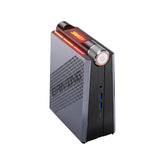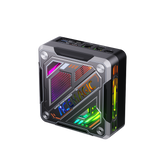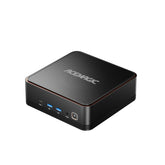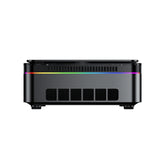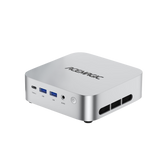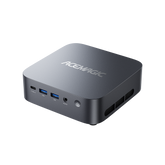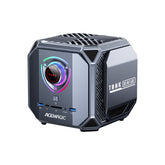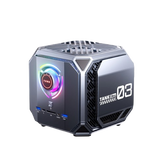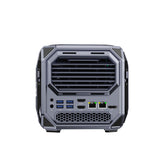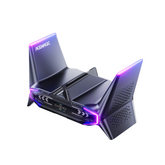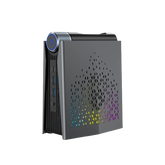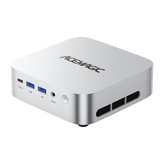Filter
14 results
20
- 10
- 15
- 20
- 25
- 30
- 50
Alphabetically, A-Z
- Featured
- Best selling
- Alphabetically, A-Z
- Alphabetically, Z-A
- Price, low to high
- Price, high to low
- Date, old to new
- Date, new to old
Sort
Sort by:
- Featured
- Best selling
- Alphabetically, A-Z
- Alphabetically, Z-A
- Price, low to high
- Price, high to low
- Date, old to new
- Date, new to old
-
ACEMAGIC AD15 Intel i5-12450H Mini PC
Excellent CPU Performance Triple display output, faster connections Faster wireless connection, more stable wired connection 16GB Dual-Channel 512GB 2280 NVMe SSD Unique Design and Portability- From $329.00
$499.00- From $329.00
- Unit price
- / per
-
ACEMAGIC AM08 Pro AMD Ryzen 7 8845HS Mini PC
AM08-CPU: AMD Ryzen™ 7 8845HS AM08-GPU: AMD Radeon™ 780M Triple-4K displays support Integrated Wi-Fi 6 and 5.2 Bluetooth for easy wireless connections- From $329.00
$499.00- From $329.00
- Unit price
- / per
-
ACEMAGIC AM18 AMD Ryzen™ 7 7840HS Mini PC
AMD Ryzen 7 7840HS(4nm, 8C/16T) up to 5.1GHz 32GB DDR5 RAM 512GB/1T M.2 NVME SSD Triple-screen 8K@60Hz display WiFi6/BT5.2/2.5Gbps Large Cooling Fan & RGB Dynamic rainbow lights- From $449.00
$539.00- From $449.00
- Unit price
- / per
-
ACEMAGIC F2A Intel Core Ultra 5 125H AI Mini PC
AI Magic Cube: Remarkable Masterpiece. Depicting Dynamic Future Intel® Core™ Ultra 7 155H Processor, 16 Cores (6+8+2 3D performance hybrid architecture)/22 Threads (24 MB Intel® Smart Cache, main frequency 3.8GHz, turbo frequency up to 4.8GHz) WiFi7+BT5.4 (Intel® Wi-Fi 7 BE200)- $368.00
$769.00- $368.00
- Unit price
- / per
-
ACEMAGIC F3A AMD Ryzen AI 9 HX 370 Mini PC
ACEMAGIC Guarantee: If you find a lower price from us within 30 days of purchasing your F3A, we will refund the difference.- From $609.00
$859.00- From $609.00
- Unit price
- / per
-
ACEMAGIC F5A AMD Ryzen AI 9 HX 370 Mini PC
- From $729.00
$959.00- From $729.00
- Unit price
- / per
-
ACEMAGIC M1 Intel Core i9-11900H Mini PC
- From $479.00
$699.00- From $479.00
- Unit price
- / per
-
ACEMAGIC M1 Intel Core i9-13900HK Mini PC
- From $329.00
$599.00- From $329.00
- Unit price
- / per
-
ACEMAGIC M1A PRO + AMD Ryzen AI MAX + 395 Mini PC
- From $1,159.00
$1,699.00- From $1,159.00
- Unit price
- / per
-
ACEMAGIC M1A TANK 03 Intel Core i9 Gaming Mini PC
The king of gaming performance, beyond configuration boundaries. Surging power, dominating the battlefield, 12th generation Intel Core i9 12900H. 3A masterpieces, full-court control, RTX 4060 Series GPUs. Blazing speed, unlocking the extreme vision. Redefining visual shockwaves. Infinite possibilities with a single click.- From $869.00
$1,399.00- From $869.00
- Unit price
- / per
-
ACEMAGIC M2A Intel Core i9 12900H Gaming Mini PC
The world's first AAA Sci-Fi Games Mini PC. 12TH Generation Intel Core i9 12900H, Cores14 Threads 20, 5.0GHz maximum RWD 24MB Cache level3 High Frequency 1.45GHZ. NVIDIA GeForce RTX 3080M 16GB GDDR6 memory Break Limits with Revolutionary 4D Cooling System. Smart Control Center Awaken Epic Energy....- From $699.99
$1,399.00- From $699.99
- Unit price
- / per
-
ACEMAGIC S3A AMD Ryzen™ 9 8945HS Mini PC
- From $209.00
$459.00- From $209.00
- Unit price
- / per
-
ACEMAGIC S3A Mini PC (AMR5 Mini PC New Upgrade)
The Mini PC S3A with AMD Ryzen 7 5700U/6800H processor has 3 modes (silent, balance, performance) and can be selected according to the use situation. Dual fans and full copper heat dissipation modules facilitate heat dissipation without compromising performance.- From $229.00
$499.00- From $229.00
- Unit price
- / per
-
ACEMAGIC W1 AMD Ryzen™ 7 8745HS /H255 Mini PC
- From $260.00
$459.00- From $260.00
- Unit price
- / per


